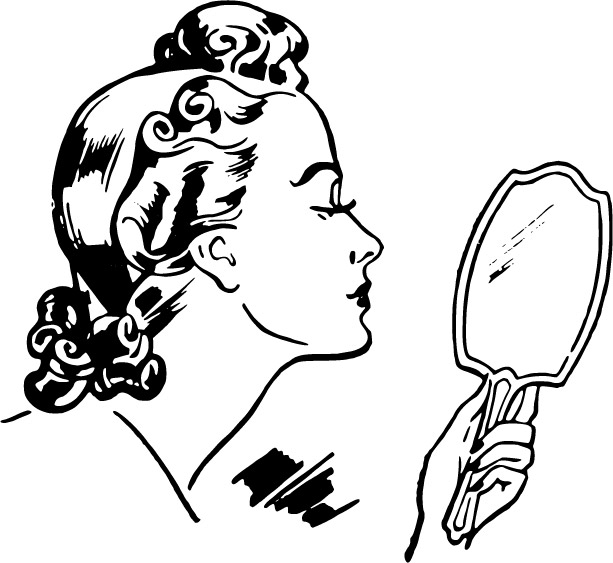The problem of mirrors and reflecting windows
During the Roman and early Christian era, glass had been invented and was used extensively for drinking vessels. However the primitive craft of glass making yielded a product that was minimally useful for windows. Impurities allowed for the transmission of light but blurred the image. There was no concept of glass being used for a mirror as we have today. Mirrors in that era were made by highly polishing a sheet of metal (Exodus 38:8; Job 37:18). Try to see yourself in a car window or a shiny piece of metal, and you’ll understand what ancient mirrors were like.
Seeing clearly is extremely important. Reading glasses, contact lenses and cataract surgery are only a few of our modern remedies for blurred or unclear vision. When someone doesn’t see clearly, and acts upon what they think they see, bad things might happen. When a driver thinks the intersection is clear but actually a car is coming, an accident is likely to occur. When a student thinks he’s finished with the exam but actually there’s five more questions on the back of the paper, he fails the test when he otherwise would have gotten an A.
When I was a kid, once in awhile I’d hear “thunk!” on a window. That sound always meant it was rescue time. Mom dashed out the door and around the side of the house, with me hot on her heels. There in the tall grass (or deep snow depending on the season) we’d carefully search around until we spied the unfortunate birdy. Having mistaken the reflections in the window for an opening into another world, the bird had flown smack into the window and suffered a tremendous blow to its head. Now it was resuscitation time. Collecting the limp feathered lump, we carried it into the house and got out the eyedropper. Mom held the bird and gently pressed its jaws to open its beak. I squeezed one drop of water into its mouth. Then we waited, breathless, hoping for motion. Sometimes we massaged its gullet. Usually after a tense moment, the bird took a swallow. We rejoiced! A few more drops and the bird was coming back to life. When it struggled to flap its wings, we took it outside and released it to fly… most certainly in the opposite direction of that darn window!
Most often, humans act upon their reason and do not follow God’s leading. However sometimes we do the opposite. Like the bird, we go too far in trusting imperfect knowledge that we believe to be from God. We see something that we think is God directing us, but it turns out to not be God. The endeavor ends in tragedy or at least disappointment. The “knowledge” declared great favor and success if he were to start a business, but despite his honest labors, he went bankrupt. The “knowledge” told the woman to sell everything including her wedding ring and give it to the preacher. Her husband divorced her, she lost her mind and died in an insane asylum. Meanwhile the preacher ran off with his secretary, was kicked out of the church and died an alcoholic. The “knowledge” told a brilliant PhD grad to marry a man who appeared to be a Christian. Though he violently abused her, further “knowledge” bid her minister to him by staying in the relationship and enduring his torture. Finally half dead, in chronic pain and permanently disabled, she got a divorce and continues to suffer the consequences of having flown into something she thought was God. She is now certain that the “knowledge” was not from God.
Some people spiritualize such things away saying “Maybe it was God’s leading after all. God doesn’t always do what we think He should.” Such rationalizing is why the scientific community and other educated people in the world think Christians are a bunch of brainless simpletons. Such reasoning is not employed anywhere else in life. Instead, we admit that we don’t know, or we made a mistake. So why can’t we admit that when it comes to God? What’s so bad about admitting that we aren’t sure whether God is telling us something or not? It doesn’t make us any less spiritual, and it certainly doesn’t damage God’s ego. There’s a phrase for our inability to own up to the fact that we don’t know everything about God: Spiritual Pride.
How many lives are ruined due to acting too flippantly or too confidently upon wrong or incomplete knowledge? How many opportunities are missed due to our failure to act upon the knowledge that we believe we receive from God? I’m very glad that back when I was young and crazy, I acted radically on a word from God. Admittedly, it was a very, very clear word – like undeniably, crazy in your face CLEAR.
But most of the time words from God aren’t that clear. To act? Not to act? Protocol is to act but to test. As with spiritual revelation, so with knowledge: “Do not believe every spirit, but test the spirits to see whether they are from God” (1 Jn 4:1). When you test the water, it doesn’t mean you totally stay out of it. Neither does it mean you dive in. You stick your toe in. Once you know the water isn’t too hot or too cold then you get in deeper. Once in, you might hit a cold spot. Do you immediately abandon the water and swim to shore? No, you persevere, and you test again. Is this cold spot telling me it’s time to get out, or is it in fact the threshold to the beautiful coral reefs I’ve been looking for? This is how knowledge should be tested to know whether it’s from God.
This uncertain knowing is exactly what Paul was referring to as “a dim reflection as in a mirror.” The day will come when we will have perfect knowledge. In that day we will see Him face to face and – glory hallelujah! – Finally we will “know as we are known.” But in the meantime, let us have the humility to admit “We know in part. We see but a dim reflection as in a metal mirror.” By being honest and then moving forward with an attitude of testing, we will find God’s actual will more frequently and function in the fullness of His purposes.
Mirrored Against Darkness
What is the climax and grand finale of our mirror lesson? The climax has now arrived, and it is this:
The queen desired to be the most beautiful in the world. Do we not also desire to be beautiful in God’s eyes? Character, virtue, knowledge, spiritual gifts – all are only a groundwork and a preparation for the PURPOSE for which the mirror is set before us, the PURPOSE for which we were reborn and purified.
Bob Pierce, founder of World Vision and Samaritan’s Purse wrote, “Let my heart be broken by the things that break the heart of God.” Seeing God reaches its earthly climax not in a deep worship experience. It does not reach its climax in a spiritual encounter. The pinnacle of seeing God occurs when what causes Him pain causes us pain; when we so lose ourselves in His will that ours fades into the background. This is the intimacy that Moses knew, in which Moses had so assimilated God’s mercy and grace as to value the life of God’s people above his own (Ex. 32:32). Throughout the Pentateuch we often hear of God’s people feeling hungry or thirsty, but never is there a mention of Moses feeling hungry or thirsty. He was entirely on task alongside God, focused not on his own needs but on God’s needs in the pursuit of God’s purposes. When Isaiah saw God he forgot himself and responded “Here am I Lord, send me!” (Is. 6).
The pure of heart having gazed upon God’s image in His mirror can no longer live for themselves. True sanctification isn’t just about overcoming sin. It is about embarking on His mission. It is about joining God’s adventure in redeeming a lost world. It is about undertaking to drive back the forces of darkness and release His love to shine into human hearts.
What is the difference between a mirror and a piece of glass? A mirror doesn’t accept and soak up the light or allow it to pass through. It has a dark, solid, backing which bounces the light back the way it came. In the process of bouncing back, the reflected light reveals a clear representation of that which was reflected. True to the characteristics of a mirror, God’s glory is seen most vividly in the presence of opposition. In our work in northern India, most people come to Christ through seeing His glory through a healing or a deliverance from a demon. A situation of adversity provided the reflective material in which God’s power could be seen. Persecution provides an opportunity for God’s glory to shine brightly because when believers persist in their faith despite ridicule, beatings and jail sentences, their neighbors see a glimpse of God’s glory. They see that Jesus is real in their lives.
Do you want to see God more perfectly? Then go to where there is darkness and opposition to His ways. Go where the people are for whom He died. Do you want to see God? It won’t happen if you stay forever in the prayer closet. It won’t happen if you look for Him primarily in the church building amongst your Christian friends. Go to those who do not yet embrace the values that you do. Follow the footsteps of Jesus – and I don’t mean to go on a pilgrimage to Jerusalem! Go to the bars, the brothels, the jails and the outcast. But not only to them. Go to the elite who are spiritually empty. Go to the politician, the banker, the marketplace leaders. Go to the atheist, the Hindu and the Muslim. Go to the young with their whole lives ahead of them. Go to the aged who face eternity without Christ. You may go with your body and open your lips. Perhaps you will go with you computer via the internet. You may go with your checkbook by enabling others to go. You may go as part of a larger ministry as an office worker or cook or janitor. Find creative ways to reach into darkened lives with the light of Christ.
Penetrating the place of darkness, loving and redeeming a world gone astray, is where you will find God’s most glorious mirrors. There you will see God most clearly. And there you will be transformed into the most beautiful prince or princess, because the only way to truly bear the image of He who “so loved the world” is to go on mission with Him into the world.





